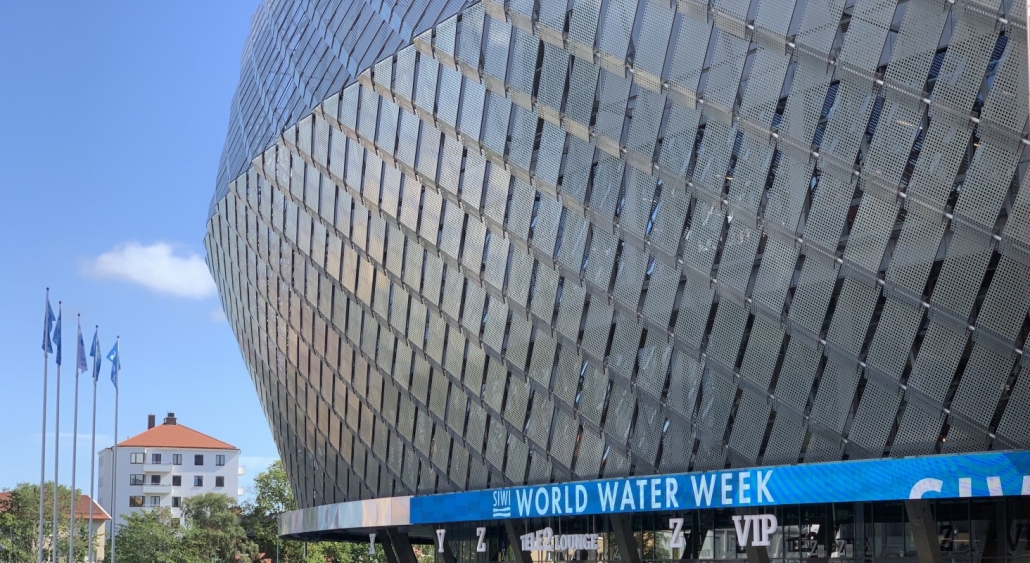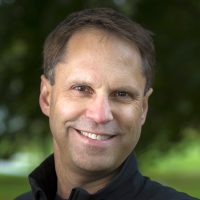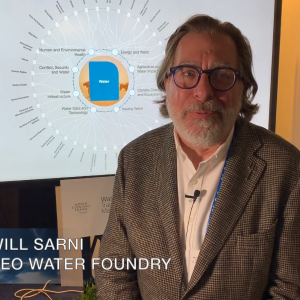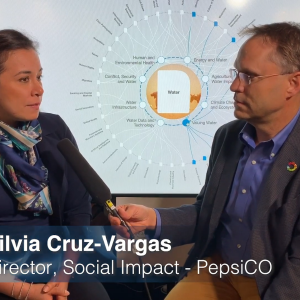Interview with Madeline Kisner and Oscar Beita, Co-Founders of RíoArte.
Speakers
Madeline Kiser
Madeline Kiser is the Co-Founder of RíoArte.
Oscar Beita
Oscar Beita is the Co-Founder of RíoArte.
J. Carl Ganter
J. Carl Ganter is co-founder and director of Circle of Blue, the center for frontline reporting, research, and analysis on water resource issues and their relationship to food and energy in a changing climate.
Madeline Kiser, Co-Founder of RíoArte, and Oscar Beita, Co-Founder of RíoArte, discuss new narratives for connecting water to non-traditional perspectives.
Transcript
J. Carl Ganter: We’re here on the floor of a World Water Week, Stockholm International Water Institute’s annual water gathering, and it’s probably the most important water gathering in a long time. Water for all of us. One of the themes here, so it is like a river flows through it, right? So we’re talking about living rivers. So who do we have here?
Madeline Kiser: Madeline Kiser, Living Rivers Movement, Costa Rica.
Oscar Beita: Oscar Beita from the same organization.
J. Carl Ganter: Now Madeline, we were just talking about new narratives for connecting water to things that we might not even think about. I know how water flows through culture, how water flows through politics, how rivers flow through even current culture and and topical issues. So describe for me what you were talking about.
Madeline Kiser: Well here in this stadium where the conversations are taking place and like little segmented, little compartments of rooms, you can get up in the bleachers and see all of the conversations on one side at once. And so much of our conversations about water had been siloed in that way, both geographically, but also in terms of the science and lack of interdisciplinary communication.
So, for example, in our area of Costa Rica where there’s been pineapple for 40 years providing jobs but not necessarily the kind that fill people’s souls. So contamination of aquifers, rivers absolutely running dry, even in the tropics. And so young people who don’t want to work in the pineapple fields for low wages are turning to easier solutions like selling drugs, becoming involved with the cartels, or they’re migrating. So we look at the migratory corridor in Central America and the solutions then become instead of spending on prisons, addiction centers, private security where our global agenda spending is going, we can spend on restoring our aquifers, creating not just jobs but connections. So water harvesting and-
J. Carl Ganter: So you made you a term, you said empty rivers, full prisons. So describe that for me. Take that a little bit further. So when we’re talking about migration, whether in Costa Rica or other parts of the world, we’re looking at water as being a major driver here and maybe not from the most obvious perspective.
Madeline Kiser: Yes, there is in our area too, one gentleman, Guillermo, whom we met in prison and near our area in a prison that was just built, $36 million. Basically, he said, “When our rivers went and our fishing went, our way of life went.” And so that leaves a vacuum and leaves a vacuum in how are you going to feed your family. but it also leaves a vacuum in your soul.
And people are again, when the rivers and aquifers and livelihoods go, increasingly, again, selling drugs, the cartels are entering in. So just looking at our global agenda, as long as we’re willing to spend on prisons and private security and again that nexus, then why don’t we just short cut that and spend on restoring, land, soil waters.
Oscar Beita: I think I can elaborate on that. I mean, for the past maybe 40 years in Costa Rica, that had been a process of concentration of land. So we used to have as farmers, small farmers in many parts of the country. And now we have large, strong national corporations that they bought the land and they are exploring produce like pineapples or other agriculture products.
And in that concentration we have lost the culture of the original communities. We have also limited the number of options that people have. And so that create a lot of unemployment among women, among young people who now are looking for alternatives.
And as Madeline was saying, sometimes the alternatives are selling drugs, getting in contact with the cartels, and then eventually through that process you end up in jail. So it is a way in which, when she talks about rivers running dry, the plantation of pineapple needs to clear completely the soil, the full vegetation to plant the pineapples. And when you do that in an area with the slopes and with a lot of precipitation, because Costa Rica has a lot of precipitation, then you end up creating a lot of erosion and sedimentation in the rivers.
And so in the winter season, the rivers flow into the community sometimes because they are so enlarged and so powerful. And during the summer season, because of the irrigation that the company does, then the rivers run dry. So in this case we’re losing the rivers, but we are gaining an incarcerated population.
Speaker 1: Wow. So are you getting any uptake as far as this connection between, again, empty rivers, full prisons, and this more holistic thinking or this bigger perspective, as you said? What’s the feedback been from the environment community, the scientific community, and even the in the government?
Madeline Kiser: I guess two things again. This year’s theme of looking at the laureate, Dr. Jackie King and Dr. Kate Brown, who have worked to develop a more ample language around when we take water out of rivers, then we get people without fish and then we get the cartels. So this is really encouraging to tip into World Water Week and be able to say there’s a connection between empty rivers and full prisons.
But also I think the water sector, if they could look, for example, how is the water sector connecting to the Green New Deal, for example, or like planning taking place in the UK and elsewhere. It’s been hard to tell, but that’s the kind of ampleness, that kind of conversation we must have as the water sector that we’re not just talking about birds or environment or rivers. We’re talking about Guillermo’s fish. We’re talking about when people lose their livelihoods and their culture, we ended up spending at a different end of the spectrum.
And so what does just transition mean in this concept, in this context where as long as we’re willing to spend on incarceration and security, just get ahead of all that and spend on basin restoration, water harvesting, soil restoration.
J. Carl Ganter: Right. But how are the politics? Are you seeing upticks in the interest in that holistic approach?
Oscar Beita: I think there is a lot of hope and opportunity in a situation like this because when rivers are running dry, eventually companies who do agro export, they are going to need the water to come from somewhere. So if they invest in restoration, if they invest in reforestation, they will be creating alternative jobs for young people to actually get involved in that.
In Costa Rica is a program of payment for environmental services for those people who protect the forest and the environment. So I think this is an opportunity to expand those programs, to reforest the areas around the rivers, to reforest the mountains and also the water sources so that the company can continue exporting and producing and communities have alternative opportunities for employment.
J. Carl Ganter: Great. So a year from now, two years from now, do you think that we’ll be making that connection more globally? I mean, we’ve always talked about water sanitation and health and education and gender and human rights. But do we think we’ll be making this more holistic connection toward livelihoods, toward economic security, really, and and human environmental security?
Madeline Kiser: I think that again, well one, that the focus on living local economies globally and focusing more than just jobs. Focusing on connection, focusing on devotion. Like Pope Francis says it so well in Laudato Si, that we begin to have a new narrative of sacrifice for each other.
But then again, I’m just so encouraged by the Green New Deal and that is another kind of comprehensive language that has quickly captured the imagination of, well, globally, and just how the water sector begins to align with that, define its role so that we, again, we’re not investing at the back end where people have lost their culture, sense of connection and spirit, their jobs, but at the front end so that we don’t lose the rivers and live simply connected to each other and where we’re from.
J. Carl Ganter: Great. Well, making the connections from culture through history and through rivers. Thanks for joining us.
Madeline Kiser: Thank you so much for having us.
Oscar Beita: Thank you very much for this opportunity.








